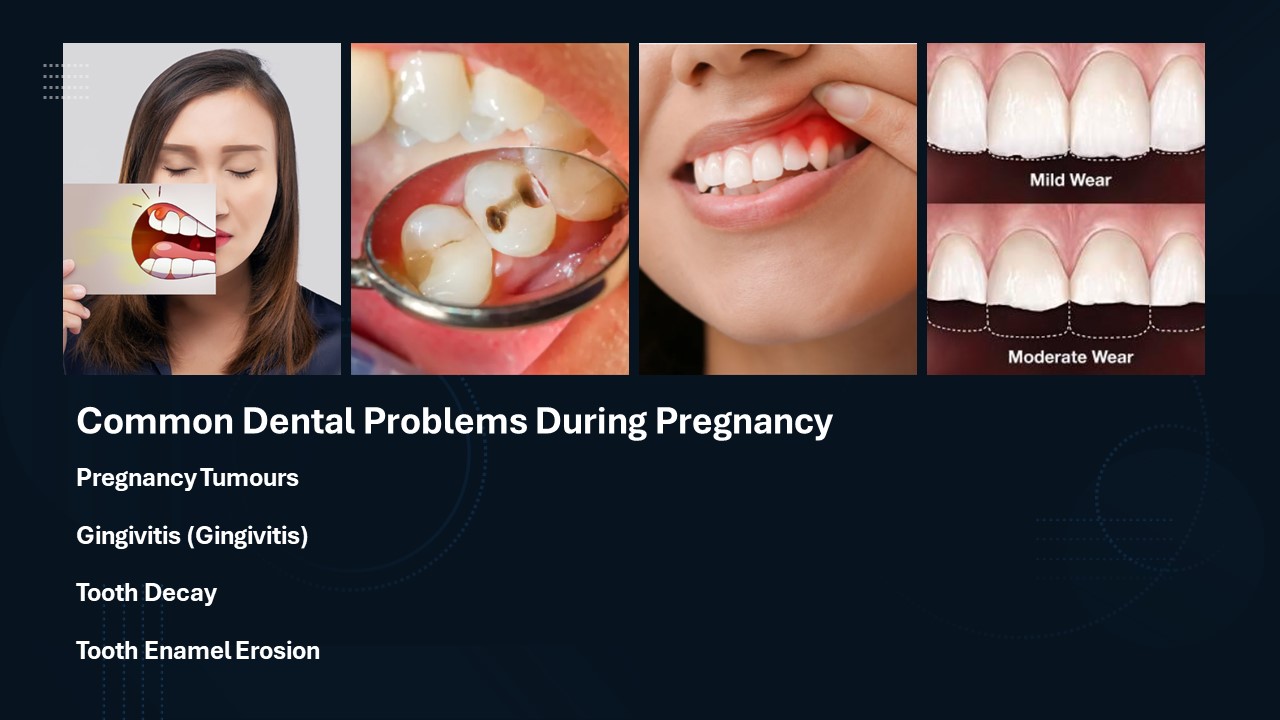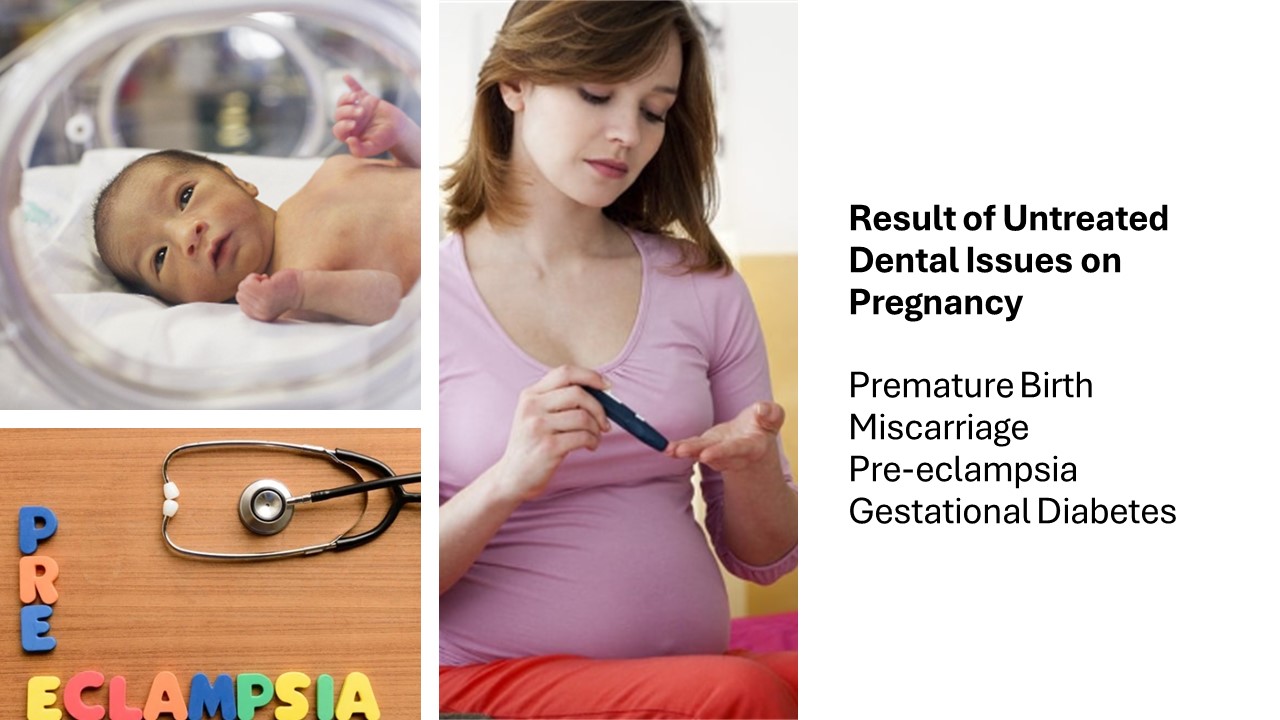
Neglecting dental care during gestation is like an athlete taking part in a competition without any preparation. During the first months of pregnancy, the developing embryo absorbs most of the calcium in the body. This can lead to weaker teeth and faster progression of cavities. In addition, vomiting, heartburn and hormonal changes in the first trimester of pregnancy lead to a decrease in the pH value in the mouth. This causes the oral environment to become much more favorable for bacterial growth.
If it is not too late, it is best to get rid of all cavities and have a thorough oral cleaning during the prenatal period. It is important to remember that neglected dental care carries the risk of developing into periodontic disease and causing it to spread to other organs. The primary risks include significant complications such as preterm labour (study), neonatal underweight, and gestational hypertension (pre-eclampsia). Therefore, regular dental check-ups and a good oral hygiene routine before and during gestation are of great importance.
What are the main causes of toothache during pregnancy?

Pregnancy is also the period when sensitivity to all kinds of stimuli is at its highest. Toothache can be felt more severe during this period. Here are the main factors that trigger toothache during pregnancy.
Hormonal changes
In pregnancy, the levels of hormones such as oestrogen and progesterone increase in the body. These hormonal changes can lead to swelling, tenderness, and bleeding in the gums. Gums becoming more sensitive can also trigger toothaches.
Increased Blood Flow
During the gestational period, the amount of blood in the body increases, resulting in increased blood flow to the gums and teeth. Increased blood flow can result in swelling and tenderness in the gums. This can lead to increased susceptibility of the gums to infection and toothache.
Morning sickness and acid reflux
Morning sickness and gastric acid reflux, which are common during pregnancy, can lead to increased acid levels in the mouth. Acid reflux from the stomach can erode dental enamel and cause cavities.
Poor oral hygiene
Pregnants should pay extra attention to their dental hygiene. In cases of nausea and vomiting, a carbonated mouthwash can be very helpful in preventing cavities and bacteria. Expecting women should take extra calcium supplements to substitute for what their teeth lose, in addition to practicing good oral hygiene.
How and when to treat teeth in pregnancy
If it is absolutely essential and there is a danger of infection, dental treatment during pregnancy can be done whenever it is most convenient for the patient. But unless there is an absolute need to, it is best to hold off until the baby's organs have finished developing, which usually happens around the 10th week of pregnancy. In cases where anaesthesia is required, treatments can be administered after the tenth week.
While dental X-rays were more of a concern in the past, today they can be used safely during the gestational period thanks to devices that emit very little radiation and only show the problem tooth. When necessary, donning a steel vest for protection can also be used to capture a three-dimensional panoramic mouth film.
Common dental problems throughout pregnancy

While it would be incorrect to link all dental issues to pregnancy, certain do become significantly more pressing during the nine months of gestation. The following are the most critical issues.
Gingivitis
Among pregnant complications, gum disease poses the greatest threat. Germs that have built up in the gums have the potential to flow all over the body and cause major infections. This is why it is so important to treat periodontitis disorders as soon as possible.
Tooth decay
The heightened demand for sweet and acidic food consumption during pregnancy can lead to an unavoidable occurrence of dental caries. Caries occurring in gestation typically does not extend to the dental pulp. Nevertheless, if dental decay initiates prior to pregnancy and remains untreated, it can lead to contamination of the dental pulp, necessitating a more complex intervention such as root canal therapy. It is important to consider that caries of a white colour can develop rapidly in the prenatal period and cause damage to the pulp.
Pregnancy tumours
Pregnancy tumours are a bleeding gum disease that occurs in 5% of pregnants. These tumours can also occasionally occur in non-pregnant women and men. They usually disappear after giving birth. The occurrence of these tumours during gestation is typically attributed to hormonal fluctuations. In some cases, these tumors may arise as a result of local irritations or impacts in the gum area.
Tooth enamel erosion
Excessive acid in the mouth can wear away tooth enamel, which subsequently weakens the teeth. During pregnancy, several factors contribute to an increase in oral acidity. For instance, hormonal shifts play a significant role in altering the pH balance in the mouth. Additionally, stomach acid often increases during pregnancy, further contributing to this acidic environment. Consequently, teeth become more vulnerable to damage and cavities, making dental care even more crucial during this period.
Prevention of toothache in pregnancy
To balance the ever-increasing mouth acidity during pregnancy, it will be very helpful to incorporate the following advice into your daily routine in addition to standard dental care;
- Chewing gum containing xylitol immediately after meals
- Chewing on a tiny piece of cheese or using a tiny bit of milk to clean your teeth, and regulate acid level in your mouth after a meal.
- Consume xylitol-rich foods such as raspberries and strawberries after meals.
- Gargling with carbonated mouthwashes following a meal.
- Keep your mouth hydrated. Drinking enough luquid boosts saliva production and reduces mouth acidity.
- It is healthier to drink water instead of carbonated drinks, fruit juices, and acidic foods. Consuming acidic drinks using a straw prevents direct tooth contact, protecting tooth enamel.
Safe dental treatments during gestation
It is best to have as little dental treatment as possible during pregnancy. Having certain treatments when they are necessary, however, is completely safe.
Routine dental cleanings
Routine dental cleaning is safe and simple to perform during pregnancy. In addition to that, detailed teeth cleaning may have significant advantages.
Emergency treatments
In gestation, any kind of dental emergency treatment is possible. The risks of infection outweigh the risks of treatment for the child by a significant margin. Specifically, any dental issues that pose a potential for infection can be addressed using anaesthesia, if deemed necessary.
Medications
Medication throughout pregnancy is administered in consultation with a gynaecologist. The dentist, in particular, may seek written approval from the patient's doctor before administering certain types of anaesthesia.
Home remedies for toothache in pregnancy
Having a toothache can get worse during pregnancy because of higher blood pressure and sensitivity. To get rid of a toothache at home during this time, you can try the followings:
Salt water rinse
Salt water can numb the painful area and relieve the pain for a while. It also works well to get rid of germs in the area.
Cold compress
The cold compress lowers the blood pressure in the area, easing the pain. However, the pain in the area returns after the cold effect wears off.
Clove oil
Clove is a plant with strong antioxidant qualities that helps relieve tooth pain. It can be applied as an oil or in its raw state.
Over-the-counter pain relievers
Most expectant mothers would prefer not to use painkillers or other medications. However, if above methods do not work, there is no harm in using these medicines as long as your doctor let them to use.
Result of untreated dental issues on pregnancy

The detrimental effects of untreated oral issues during pregnancy might be catastrophic. The following are some of the most significant outcomes that have resulted from these neglegances.
Premature birth
Periodontal disease triggers the secretion of prostaglandins and other inflammatory mediators, which can set the stage for labour. The likelihood of premature labour can also be increased when gum disease and infections go untreated since they cause inflammatory responses in the body.
Miscarriage
Gum disease and infections can adversely affect the development of the foetus, leading to a low birth weight (below 2500 grams). Bacterial infections and inflammation can prevent the foetus from getting enough nutrients and oxygen, the infant does not develop to their full potential.
Pre-eclampsia
Pre-eclampsia is a serious condition that manifests during pregnancy as high blood pressure and protein in the urine. Mouth infections and gum disorders can raise the risk of pre-eclampsia. Blood vessel damage brought on by inflammation and infections might result in elevated blood pressure.
Gestational diabetes
Our body becomes even more sensitive in the course of pregnancy, and untreated gum disease during this period can also increase insulin resistance and make it difficult to control blood sugar. This increases the risk of developing gestational diabetes.
What Painkillers are Safe During Pregnancy?
Unless absolutely necessary, it is advised that you abstain from using any medication while pregnant. Contrary to popular belief, very few medications actually have any negative effects on the developing foetus. Even if a painkiller is used without a doctor's advice, it is extremely unlikely to harm the child.
Using inflammatory medicines in the latter weeks of pregnancy is the most crucial restriction on painkiller usage in gestation. Babies may have trouble breathing if certain pain relievers are used during pregnancy. Aside from this, it is safe to utilise any medication that a gynaecologist has prescribed while pregnant.
Final thought
In pregnancy, limiting oral care solely to hygiene practices is not advisable. Ensuring adequate calcium intake and maintaining optimal acid balance in the mouth are crucial during this period. Additionally, it's important for mothers-to-be to have their salivary glands evaluated to confirm proper function, and treatment should be sought if needed.
At Antlara Dental, we consider our educational efforts in oral health to be an integral part of our treatment processes. By following Antlara Dental's monthly Tooth Talks magazine, you can gain valuable insights into maintaining your oral health.
